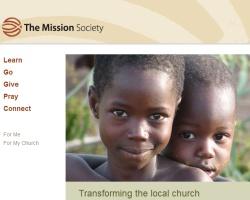While African-American churches in the United States have very little participation in world missions, these congregations are uniquely poised to have a big impact on global evangelism, according to Richard Coleman, an African-American evangelical leader, missions expert and director of candidacy and mobilization for The Mission Society.
Coleman is calling on African-American churches to confront their long-standing lack of involvement in missions and break down the barriers holding them back from participating. Estimates have showed African-Americans typically represent less than 1 percent of all full-time missionaries from the United States and have not been involved in cross-cultural missions for several reasons, according to Coleman.
“Black churches must often help members of their own congregation with food, utility bills and other needs that majority churches don’t have to worry about to the same degree,” said Coleman. “It’s not a bad thing that black churches help their own communities,” he said. “They often have very different needs that force them to underemphasize world missions.”
Lack of understanding of missions is another reason. “For example, when some blacks think of missionaries, they think of the older ladies who wear white dresses and visit the sick,” said Coleman.
Other factors Coleman cited that have contributed to the low missions participation rate by African-American churches include an overemphasis on personal prosperity and fear of the unknown or of leaving their comfort zone.
Coleman said one reason African-Americans are positioned for greater involvement in world missions is because they identify with suffering.
“When you look at black history, there’s a lot of suffering,” Coleman said. “People around the world have heard that story and have seen the overcoming of struggles. Black churches have a message of encouragement for the world.”
Gospel choirs are another unique opportunity black churches can contribute to missions. “If you look at Poland, Japan, Sweden, black gospel music is very popular and a great tool for sharing the gospel,” Coleman said.
To get more involved in missions, Coleman said, African-American churches should be willing to learn, partner with other churches that have successful missions programs–and they should pray.
The best advice Coleman has for African-American congregations interested in being used by God in missions? “Spend time and ask God: ‘In what communities and groups would You have us be involved?'” he said.
Coleman, who joined The Mission Society in 2006, is among 400 invitees from the United States who will participate in the Third Lausanne Congress on World Evangelization in Cape Town, South Africa, Oct. 16-25.
Before joining The Mission Society, Coleman served as director of missions at a mega-church in the Greater Atlanta metropolitan area. He has also taught mission classes and planned and led short-term mission trips to several countries, including Kenya, Honduras, Canada and the Dominican Republic.
Founded in 1984 in the Wesleyan tradition, The Mission Society recruits, trains and sends Christian missionaries to minister around the world. At present, it has more than 200 missionaries in 38 countries. The Mission Society develops diverse programs and ministries in accordance with its missionaries’ unique callings and gifts, ranging from well-drilling and the arts to more traditional ministries such as teaching English and church planting. Its church ministry department provides seminars, workshops and mentoring for congregations in the United States and overseas, helping equip churches for strategic outreach in their own communities and throughout the world.




